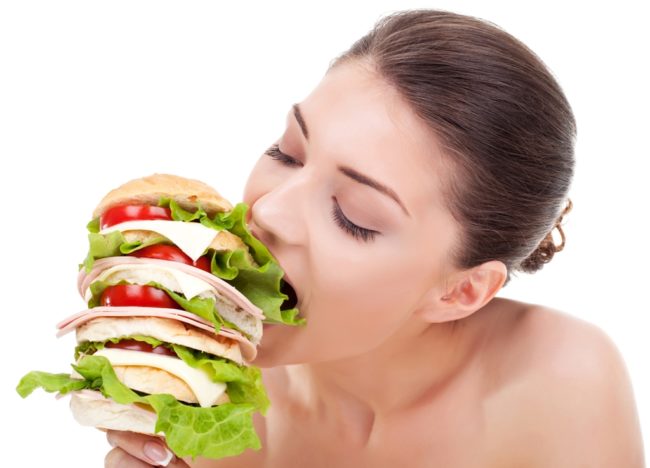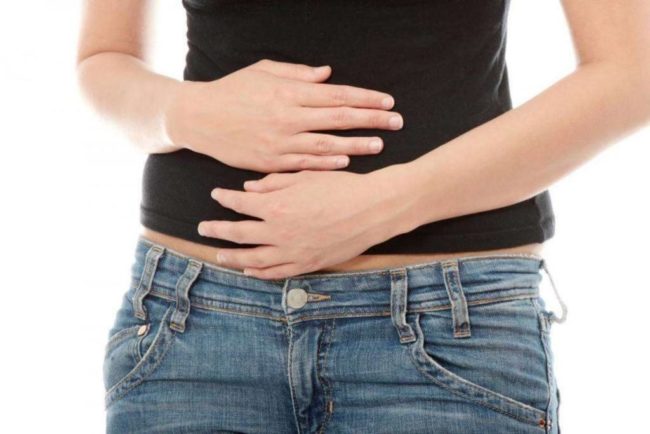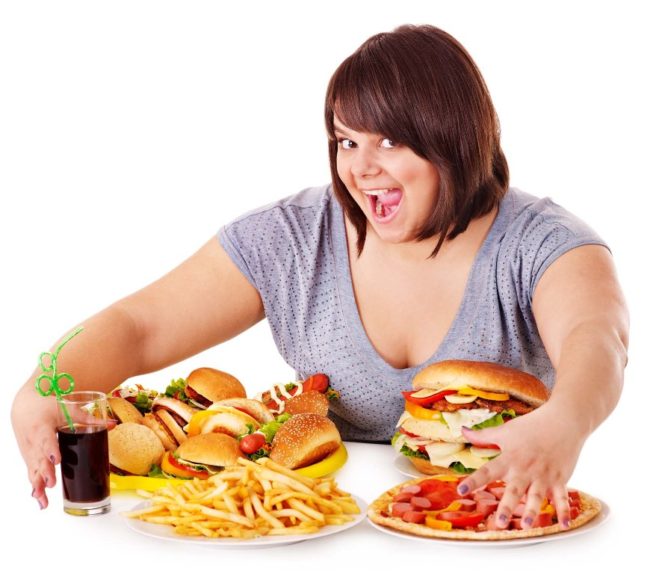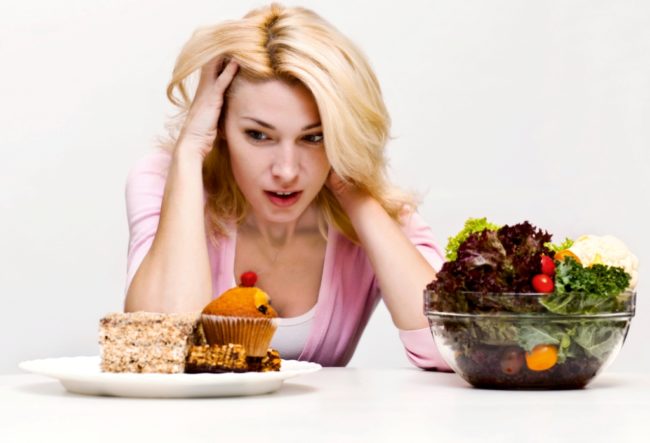Holidays, meetings with friends, noisy parties or other celebrations with an abundance of delicious satisfying dishes on the festive table, bring not only positive emotions and pleasure from food, but also some unpleasant consequences. Probably, many had to deal with overeating after a plentiful feast with many delicious and tasty dishes, each of which I would definitely try. As a result, the next day there is a general malaise, weakness throughout the body, severity in the stomach or nausea. What to do if you overturn and what overeating leads to, especially if it is regular, read in this article.
Content
What is overeating and why it arises
Overeating is a disorder of food intake, in which a person absorbs an excess of food, much more than his body needs, and cannot stop at the right time.
The topic of proper and healthy diet is one of the most relevant in the modern world. American scientists have calculated that a modern person consumes 2 times more food than our ancestors. Overflow is one of the main and dangerous “enemies” of all mankind, every second one has ever encountered a similar problem, and for many, overeating becomes a bad habit, which not only to get rid of.
A human stomach is able to stretch under the influence of foods coming into it, 6 times larger than its size in a normal state. The receipt of more food in it is dangerous to health and overall well -being. Ideally, a person should eat only when he feels hunger and consume small portions. But, often we eat when we are bored, we feel stress, for the company. Many do not even realize that they regularly overeat. 
Symptoms of overeating
Most often, symptoms of overeating occur in those who lead a sedentary or sedentary lifestyle. After a one -time overeating, for example, after a plentiful feast, you can feel:
- a feeling of heaviness in the stomach, stomach;
- bloating, the appearance of gas formation and flatulence;
- heartburn, nausea, general malaise, sometimes insomnia;
- pain in the intestines, colic;
- it becomes hard to move, I want to lie down and not move.

If the excess meal has acquired a regular character for a long time, you can notice and feel the following changes in your body:
- A quick weight gain occurs, especially for those who do not engage in physical activity. The number of calories consumed with a large amount of food increases, and energy is not spent.
- Serious problems with sleep appear, it is increasingly difficult for a person to fall asleep, insomnia torment him.
- A constant feeling of gravity and discomfort in the intestines annoyes a large accumulation of gases and flatulence.
- Eating is not controlled. A person eats not only when hungry, often snacks (when watching a TV, reading a book or working at a computer), abuses harmful fast food and sweet.
The main reasons for overeating
- A feeling of satiety in a person occurs only 15-20 minutes after eating. The habit is quickly and there is a lot - a direct path to overeating.
- The food culture is vaccinated from an early age. If a person has eaten a lot from childhood, “with an addition”, over time, the volume of its stomach increases and can accommodate up to 2.5 liters of food.
- A person’s appetite depends on the components that enhance the taste of the dish that are included in food. For example, sauces (mayonnaise, ketchup), seasonings, additives and flavor enhancers.
- The abuse of semi-finished products, fast food or street food, which attract their accessibility, appearance and appetizing aroma.
- A person is surrounded by a lot to eat. This is especially true for holidays, feasts and festivities with an abundance of high -calorie fatty dishes, from which tables are breaking. It is very difficult to control yourself and resist the temptation to try all goodies.
- Lack of diet at the modern pace of life. The missed breakfast and lunch is replaced by snacks and replenished with plentiful, hearty dinner, usually before bedtime. Against the background of improper nutrition, a systematic overeating arises and a set of excess weight, from which it is more difficult to get rid of.
- Emotional overeating due to stressful, conflict life situations. Many shift their bad mood, depression and failure. Delicious food becomes for them comfort and outlet.
- Strict monodites can cause overeating. The body tries to make up for its reserves at the time of breakdown, which happens quite often.

What is overeating leading to
Doctors and nutritionists are in alarm and urge everyone to revise their nutrition, reduce the volume and calorie content of food consumed. Systematic overeating leads to metabolic disorders, excess weight and health problems cannot be avoided. The consequences of systematic overeating can be:
- Excess weight. This is not only a feeling of severity throughout the body, the loss of attractiveness and fitness, but also an additional load on the joints, the spine.
- Problems with the gastrointestinal tract and liver. Overflow leads to diseases such as gastritis, colitis, cholecystitis, pancreatitis. Uncontrolled eating fatty, fried, sweet foods amazingly affects the liver, provoking cirrhosis of the liver. Constipation appears that lead to the development of hemorrhoids.
- Heart disease and cardiovascular system. With increasing weight, the growth of all the internal organs of a person occurs to ensure their work, the heart has to work with a vengeance, pumping blood to vital organs. Due to increased load, heart contractions increase, the muscle tissue of the heart occurs, a person has problems with pressure, hypertension and atherosclerosis appear.
- Due to overeating in women, a hormonal failure occurs: the menstrual cycle is disturbed, problems with conception arise. Men have problems with an erection.

What to do if you move?
If you could not resist the temptation and ate more than you planned, do not despair. There are many ways to relieve unpleasant sensations and get rid of the symptoms of overeating.
- The best and fast way to improve health is to take a special drug, the effect of which is aimed at improving the digestive system.
Such drugs include: Festal; Creon; Hermital; Mezim; Digestal; Panzinorm.
- If there is no medicine from this list at hand, you do not know what to do if you overturn, and also feel sick, take activated coal tablets that act as a sorbent (1 tablet per 10 kg of body weight). Already after a quick period of time, bloating, nausea and pain in the stomach will pass. With nausea, it is forbidden to independently cause vomiting. If you crossed it and tore out, take a horizontal position and drink more fluids, for example, weak unsweetened tea to prevent dehydration.
- After a plentiful meal, it is not recommended to immediately go to rest or sit at the table for a long time. In the rest of the organism, consuming a minimum amount of energy, the metabolism slows down, and therefore there is a severity in the stomach and the deposition of extra pounds is deposited. What to do if you moved and are afraid to get better? It is better to take a walk with a leisurely step in the fresh air, wash the dishes or dance if you are at the celebration. After easy physical activity, the body will quickly return to normal and restore its work.
- The juice of fresh lemon helps from the sensation of heaviness in the stomach. Just a few sips of lemon Fresh will return you to life. The seeds of caraway seeds, coriander, anise have a similar action. Lift a few seeds after a plentiful dinner or swallow them, washed down with a small amount of water. It should be remembered that drinking a lot of water immediately after eating is harmful, drink water or other drinks half an hour after eating. Green tea with mint also helps to remove heaviness in the stomach.
- If you want the food to digest faster, due to the accelerated secretion of gastric juice, make a chewing gum.
What to do if you moved overnight?
Late dinner, with an abundance of fatty and high -calorie dishes, is very harmful to our body, which should restore strength at night, and not digest food. Infutable rest leads to a bad mood in the morning, a state of breakdown, and not the vigor and energy of energy for the whole day. In addition, the night meal has a negative effect on hormonal processes in the body, stimulating the production of insulin, which converts consumed calories into fat deposits on the body and internal organs. Therefore, it is recommended to have dinner no later than 3-4 hours before bedtime. If severe hunger torments, drink a glass of kefir before going to bed. If overeating at night could not be avoided - take Mesim, Festal or other drugs that normalize digestion and, if possible, take a walk in the fresh air.

What to do if you have moved sweets
All women like to enjoy sweet confectionery, baking, chocolate. When overeating sweet foods, nutritionists recommend drinking a lot of pure water, as sweets cause a strong sense of thirst. With a feeling of heaviness in the stomach, a cup of ginger tea without sugar helps effectively.
What to do if you moved chocolate? Everyone loves chocolate: from small, to great. Overflow of chocolate threatens with obesity, an increase in blood glucose, can cause insomnia. If you could not resist and overturn it, refrain from eating the whole next day, eat green apples, you can drink a glass of kefir, and also drink clean water in unlimited quantities.

What to do if you moved the salty?
With abuse of salty, for example, she moved salted nuts, there may be nausea, heaviness, what to do? Brew tea with rosehips and drink it throughout the day, after overeating.
What to do if it has overturned and is sick?
Excessive consumption of fatty foods causes general weakness, nausea. With the symptoms of overeating fat, you should take tablets of activated coal or drugs to improve digestion. During the day, it is necessary to arrange a fasting day and drink water with lemon juice. It is recommended to make an enema for complete intestinal cleansing. Good walks are useful.

What is compulsive overeating: signs and causes
The desire to eat deliciously, especially during holidays, occurs in many, and is a completely normal phenomenon, but, systematic consumption of a much larger amount of food than the body needs and the inability to control the amount of food eaten is already a food disorder called compulsive overeating. It requires treatment, it will not be possible to get rid of dependence on your own. Compulsive overeating is destructive for humans, both at psychological and physical levels. Most often, there is a lot of bad habit from childhood. With the help of food, a person compensates for negative emotions, the unrest of the experiences that he experiences, “seizing” his problems. He subconsciously seeks a pleasure that will distract him from negative or sad thoughts, will make it happier for a moment.

The reasons for compulsive overeating
- For many people suffering from compulsive overeating, delicious food, especially sweets, is a cure for depression, psychological problems and mental pain. Making the pleasure of food, mood and well -being increased, but only for a while. The problem is not solved, but is aggravated even more.
- Compulsive overeating can occur against the background of health problems and be a symptom of diseases such as diabetes mellitus, with impaired functioning of the thyroid gland, with head injury.
- The problem with excess weight makes a person limit himself in nutrition and observe strict diets, after which breakdowns often occur. A person cannot control the consumption of food and makes up for the missed.
Signs of compulsive overeating
- A person cannot control the amount of food, he does not experience a sense of saturation and continues to meal.
- Stress, experiences, unrest or boredom provoke attacks of gluttony.
- The desire to eat something "tasty", to eat, arises very often. A person suffering from compulsive overeating is constantly chewing something, even on the go.
- A person can eat a large amount of food alone, as he feels shame in public, because he eats a lot.
- A short period of time passes between meals.
- After an attack of gluttony, many experience guilt, aversion to their body, get angry, feel powerless and devastated, and fall into even greater depression.

What is dangerous food disorder?
Compulsive overeating is an enemy not only for a slender figure, since it is fraught with a quick set of excess weight, but for the whole organism as a whole, and leads to a number of serious problems:
- type II diabetes;
- gallstone disease;
- increasing blood cholesterol;
- hypertension, heart disease, blood vessels;
- depression, thoughts of suicide.
Compulsive overeating: treatment
The habit of eating compulsively will not pass on its own, especially if it has deep roots of psychological and emotional problems, for many years. For example, dissatisfaction with your body, loneliness. In addition to drug treatment with medicines that relieve the symptoms of overeating, reducing appetite, diet, the patient needs the help of a therapist. You need to contact him for help without fail. Treatment includes:
- medical treatment, taking antidepressants;
- behavioral group or individual psychotherapy, hypnosis.
The main task of treatment is to eliminate all psychological reasons that caused this food disorder.
How to get rid of compulsive overeating yourself?
- Find the lesson to your liking, distracting from thoughts about delicious food. It can be an exciting hobby, a new interesting job that takes all free time.
- Do not buy a lot of products for the future, so you will not have a temptation to eat everything at once. It is better to go to the store more often and not overeat, especially walking is good for health.

- Try to cross out their diet all “harmful” food: fast food, chips, crackers, as well as sweets. Diversify the menu with fresh vegetables, fruits, dairy products.
- Include bran, oatmeal, muesli, cottage cheese in the diet, which give a feeling of saturation and satiety for a long time.
- Try not to eat alone, in public you can control the volume of food eaten.
- Keeping a food diary, which takes into account the calorie content and volume of portions, disciplines and teaches to eat right.
- Motivate yourself to lose weight, set a target. For example, get into a beautiful dress, several sizes smaller than yours.

- It is recommended to undergo an examination to exclude the presence of a disease that provokes a constant feeling of hunger (diabetes).
- Go in for sports or any physical exertion. So you can distract from your problems, improve your appearance.
- Do not be afraid to ask for help and support from loved ones, find like -minded people who will be easier to deal with the problem, you can exchange experience, share the results of their achievements and tips.
Remember that food should give pleasure, and not harm health and your life.









Comments
a couple of years ago, there was no side of metrogils from the same problem, there were no side effects ...
I’m not a fan of peeling at all, it saves from acne of metrogil, it also smoothes it ...
Great article! ...
I take the second course of the Capsules Climafite 911. The tides went very quickly. It became calmer, irritability went away and I sleep well ...
i also noticed - it is worth nervous, everything immediately affects the face. Therefore, I try to avoid conflicts and unpleasant people. Of the creams, I like Miaflow from wrinkles - smoothes not only small wrinkles ...